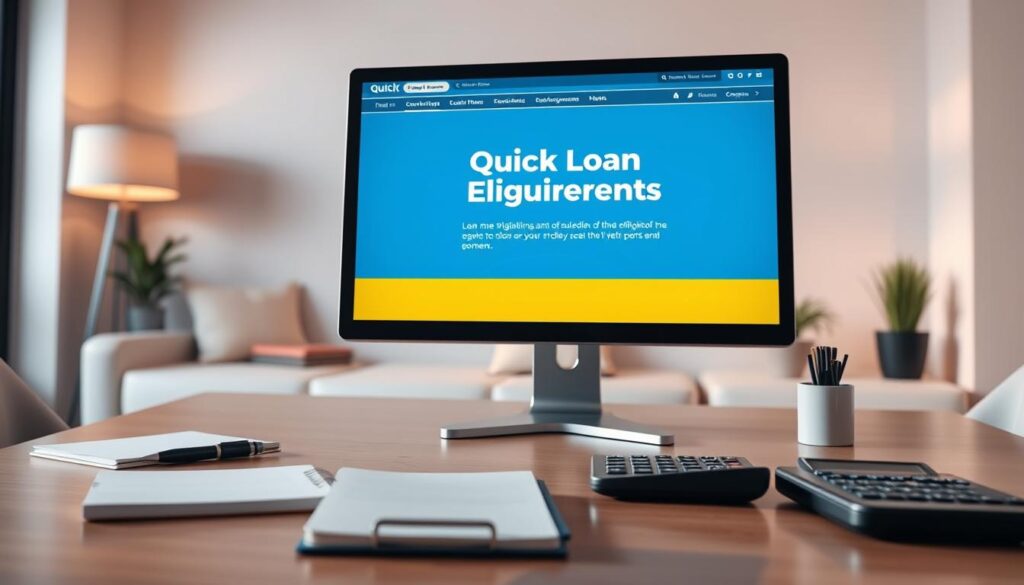Quick Loans: Secure Funding in Minutes
In today’s fast world, money troubles can pop up anytime. Luckily, some lenders can give you online cash advances in just a few minutes.
Dealing with financial uncertainty can be really tough. That’s why we’re here to help you get a quick loan with fast approval. Our secure loan application keeps your info safe.
If you’re looking for quick personal loans, check out CNBC’s Select. They list lenders that can fund you in just one business day.
Key Takeaways
- Quick loans offer rapid access to funds, often within minutes or on the same day.
- A secure loan application process protects your personal and financial information.
- Fast approval times enable you to address financial emergencies promptly.
- Online cash advances provide a convenient way to access funds when needed.
- Some lenders offer same-day or next-day funding options.
What Are Quick Loans?
Quick loans offer fast financial help for urgent needs. They are made for people who face sudden expenses or emergencies.
Definition and Overview
Quick loans are fast to get and use. They are short-term loans to be paid back quickly, often in weeks or months. They’re perfect for emergencies when you need money fast.
Types of Quick Loans
There are many quick loans for different needs. Here are some common ones:
-
- Payday Loans: Short-term loans paid back on your next payday.
- Personal Loans: For emergencies, home fixes, or medical costs.
- No Credit Check Loans: For those with bad or no credit.
- Instant Payday Loans: Quick help with the money given fast.
Common Uses for Quick Loans
Quick loans are for many needs, like:
-
-
- Emergency costs, like car fixes or medical bills.
- Home repairs or upkeep.
- Unexpected bills, like utilities or rent.
-
They act as a financial backup for sudden expenses or emergencies.
How Quick Loans Work
Getting a quick loan is easy and fast. We’ll show you how it works, from start to finish.
Application Process
To get a quick loan, you just need to give some basic info. This includes your name, address, how much you make, and where you work. You can apply online, making it simple to do from anywhere.
Required Documents: You’ll need to show who you are, proof of your income, and a bank statement. The exact documents needed can change based on the lender.
Approval Criteria
Lenders check a few things before saying yes to your loan. They look at your credit score, how much you make, and how much debt you have. Even if your credit isn’t perfect, many lenders will still consider you.
Key Considerations: Your credit score matters, but it’s not everything. Lenders also want to make sure you can pay back the loan.
Funding Timeline
Quick loans are great because they fund fast. Many lenders can get you money same day or the next day.
Here’s how different lenders compare in terms of funding time:
| Lender Type | Funding Timeline | Notes |
|---|---|---|
| Online Lenders | Same Day or Next Day | Often uses automated systems for quick approval and funding |
| Banks | 1-3 Business Days | May have more stringent requirements and slower processing |
| Credit Unions | Varies | Can be faster than banks, but often depends on the credit union’s policies |
Knowing how long it takes to get funded is key for planning your finances. Always check with the lender about their funding schedule.
Benefits of Quick Loans
Quick loans are a fast and efficient way to get the money you need. They are made for urgent financial situations. They offer many benefits that make them a good choice for many people.
Fast Access to Funds
One big plus of quick loans is the fast access to funds. They are much quicker than traditional loans, which can take a long time. This is great for emergencies when you need money fast.
The application for quick loans is simple. This means you can get fast approval and get your money quickly. This is a big help for people in financial trouble.
Flexibility in Usage
Quick loans also give you flexibility in usage. You can use the money for anything you need, like repairs or medical bills. This makes quick loans very useful.
This flexibility lets you handle your financial needs without being tied down by the loan’s rules. Quick loans are a smart choice for many situations.
Minimal Requirements
Another good thing about quick loans is the minimal requirements for getting one. They are easier to qualify for than some other loans. This makes them available to more people.
Quick loans also need minimal documentation. This makes applying for them easier and faster. It helps you get the money you need without a lot of hassle.
Key Features to Look For
It’s important to know the key features of quick loans before making a choice. Several factors are important to ensure you pick the right loan for you.
Interest Rates
Interest rates on quick loans can differ a lot between lenders. It’s essential to understand the interest rate you’re offered. This rate affects the total cost of the loan.
For example, some lenders offer loans with an annual percentage rate (APR) between 300% and 900%. Carefully reviewing the APR is key to knowing the loan’s true cost.
Loan Amounts
Quick loans offer a range of amounts, from small to large. The amount you can borrow depends on the lender and your financial situation.
Some lenders offer loans as low as $100, while others may offer up to $1,000 or more.
Repayment Terms
Repayment terms for quick loans vary. Some require repayment in a few weeks, while others offer longer terms.
It’s crucial to understand the repayment schedule. Make sure it fits your financial situation to avoid late fees or penalties.
| Feature | Description | Importance |
|---|---|---|
| Interest Rates | The rate at which interest is charged on the loan | High |
| Loan Amounts | The amount of money you can borrow | Medium |
| Repayment Terms | The schedule and conditions for repaying the loan | High |
“The key to managing debt is understanding the terms of your loan and making timely payments.”
Quick Loans vs. Traditional Loans
It’s important to know the differences between quick loans and traditional loans. This helps you make a smart choice.
Speed of Approval
Quick loans and traditional loans differ in how fast they get approved. Quick loans can give you money in a day or two. Traditional loans, on the other hand, can take days or weeks.
Quick loans have a simple application process. This lets lenders make decisions quickly. Traditional loans need more checks, so they take longer.
Documentation Requirements
Quick loans need less paperwork than traditional loans. You might only need to show proof of income and ID.
Traditional loans, though, ask for a lot more. This includes credit reports, financial statements, and details about any collateral.
| Loan Type | Documentation Requirements |
|---|---|
| Quick Loans | Minimal documentation (proof of income, ID) |
| Traditional Loans | Extensive documentation (credit reports, financial statements, collateral) |
Interest Rate Comparisons
Interest rates also vary between quick loans and traditional loans. Quick loans usually have higher rates because they’re riskier.
Traditional loans, with their detailed credit checks, often have lower rates. But, the rate can change based on your credit and the loan’s terms.
| Loan Type | Interest Rate |
|---|---|
| Quick Loans | Higher (varies by lender) |
| Traditional Loans | Lower (based on creditworthiness) |
Eligibility Requirements
Knowing what you need for quick loans is key to getting approved. Lenders look at many things to see if you qualify.
Credit Score Considerations
Credit score matters a lot. Even with bad credit, some lenders can help. But, a good score means better loan terms. A score of 650 or above is seen as good.
Income Verification
Lenders want to know you can pay back the loan. They check your income with things like pay stubs or tax returns. Having a steady income is important for approval.
Age and Residency Requirements
You must be a certain age and live in the right place. Usually, you need to be 18 or older and live in the United States.

| Requirement | Description | Typical Criteria |
|---|---|---|
| Credit Score | Indicates creditworthiness | 650+ considered good |
| Income Verification | Proof of stable income | Pay stubs, bank statements |
| Age | Minimum age to apply | 18 years old |
| Residency | Country or state of residence | Resident of the United States |
For more info on quick loans, check out Lending Club’s guide. Always read the terms and conditions before you apply.
Potential Drawbacks of Quick Loans
Quick loans seem appealing but come with downsides that can hurt your finances. They offer fast help in emergencies but come with big costs and risks.
It’s key to know the downsides of quick loans. High interest rates are a big worry. They can make the total amount you pay back much higher.
High Interest Rates
One major issue with quick loans is the high interest rates. These rates are often much higher than regular loans. This makes borrowing more expensive.
For example, a quick loan with a 300% APR might seem okay at first. But, it can become too much when you look at the repayment terms. As
“The high interest rates associated with quick loans can lead to a cycle of debt that is difficult to escape.”
Potential Fees
Quick loans also have potential fees that increase the cost. These fees can include origination fees, late payment fees, and more.
To avoid these extra costs, it’s important to carefully review the loan terms before agreeing. Knowing all the fees and charges can help you avoid surprises.
Risk of Debt Cycle
The risk of debt cycle is another big worry with quick loans. You might need more loans to pay off the first one, creating a cycle of debt.
To avoid this, make a budget and plan for repayment before getting a quick loan. This way, you can manage the loan well and reduce the risk of getting stuck in debt.
Where to Apply for Quick Loans
Knowing where to apply for quick loans is key. It helps you get the best deals. Look for places that offer good terms and conditions.
Online Lenders
Online lenders have changed the game with their fast and easy applications. They usually have fewer rules than banks. As Quora
Credit Unions
Credit unions are a great choice for quick loans. They are owned by their members and often have better rates and terms. Member benefits include personal service and a community feel.
Banks and Financial Institutions
Banks and financial institutions still offer quick loans. They have many products and a trusted reputation. But, their rules might be stricter, and the process can take longer than online lenders.
As
“The right lender can make all the difference in your loan experience.”
Choosing the right lender is all about your needs. It’s important to compare what different lenders offer. This way, you can find the best one for you.
Tips for Getting Approved
Getting quick loan approvals is easier when you improve your credit and gather needed documents. Knowing what lenders want can boost your application. This increases your approval chances.
Improve Your Credit Score
Your credit score is key for loan eligibility. To improve your credit score, pay bills on time, lower your debt, and fix credit report errors. A better score means more approval chances and possibly lower interest rates.
Here are some key strategies to boost your credit score:
- Make timely payments
- Keep credit utilization below 30%
- Monitor your credit report regularly
Gather Necessary Documents
Lenders need specific documents for your loan application. Gathering these documents in advance makes the process smoother. You’ll need ID, income proof, and bank statements.
Make sure you have these documents ready:
- ID proof (driver’s license or passport)
- Proof of income (pay stubs or tax returns)
- Bank statements
Choose the Right Lender
Not all lenders are the same. Choosing the right lender greatly impacts your loan experience. Look at interest rates, loan terms, and customer service.
When picking a lender, consider these factors:
- Interest rates and fees
- Loan amounts and repayment terms
- Customer reviews and reputation

Managing Quick Loan Repayments
Understanding how to manage quick loan repayments is crucial. It helps you avoid financial stress and keeps your credit score healthy. Effective repayment management prevents debt traps.
Setting a Budget
Start by setting a realistic budget for your loan repayments. Look at your income and expenses to see how much you can pay each month. Creating a budget for your loan repayment helps you stay on track and avoid missed payments.
To make a budget, track your income and expenses. Find ways to cut back on unnecessary spending. Use the saved money for your loan repayment. Budgeting apps or spreadsheets can help you stay organized.
Understanding Repayment Schedules
Knowing your repayment schedule is key. It shows how much you owe, when it’s due, and how long the loan lasts. Reviewing your repayment schedule carefully helps you plan and avoid late fees.
Lenders usually provide clear repayment schedules. Make sure to review it and ask questions if needed. This information helps you plan your budget better.
Options for Early Repayment
Managing your quick loan gives you the chance to repay early. Early repayment saves on interest and reduces debt. Checking with your lender about early repayment options is important.
If early repayment is allowed, consider paying more or making lump sum payments. This can help you pay off your loan faster and save on interest.
Real-Life Scenarios Using Quick Loans
Quick loans can be a lifesaver in many situations. They provide immediate financial help when you need it most. These loans are made to help people deal with unexpected money problems.
Emergency Expenses
Quick loans are often used for emergency expenses. This includes things like a car breaking down, losing your job suddenly, or needing to travel quickly. They give you the money you need right away.
- Car repairs to get back on the road
- Temporary accommodation costs due to unforeseen circumstances
- Urgent travel expenses for family emergencies
Home Repairs
Homeowners sometimes face unexpected repair costs. This could be fixing a leaky roof, replacing a faulty boiler, or dealing with electrical problems. Quick loans can help pay for these repairs, keeping your home safe and secure.
Examples include:
- Roof repairs to prevent further damage
- Plumbing fixes to avoid water damage
- Electrical repairs to ensure safety
Medical Bills
Medical emergencies can lead to big expenses. This includes hospital bills, medication, and rehabilitation costs. Quick loans can help cover these costs, so you can get the medical care you need without delay.
Common medical expenses covered by quick loans include:
- Hospitalization costs
- Prescription medication
- Rehabilitation services
In conclusion, quick loans are a practical solution for many financial challenges. They help with emergency expenses, home repairs, and medical bills. By understanding how quick loans work, you can make better financial choices.
Conclusion: Are Quick Loans Right for You?
Thinking about a quick loan? It’s key to check if it fits your financial needs. Quick loans offer fast cash but might have high interest and fees.
Assessing Financial Needs
Wondering if a quick loan is for you? Look at your money situation first. Check your budget, income, and spending to see if you can handle the loan payments.
Final Thoughts
Quick loans can help in emergencies or sudden money needs. But, make sure to read the loan details carefully before you decide.
Exploring Your Options
Looking for the right loan? Check out different lenders to find the best one for you. This way, you can make a smart choice and avoid trouble.









